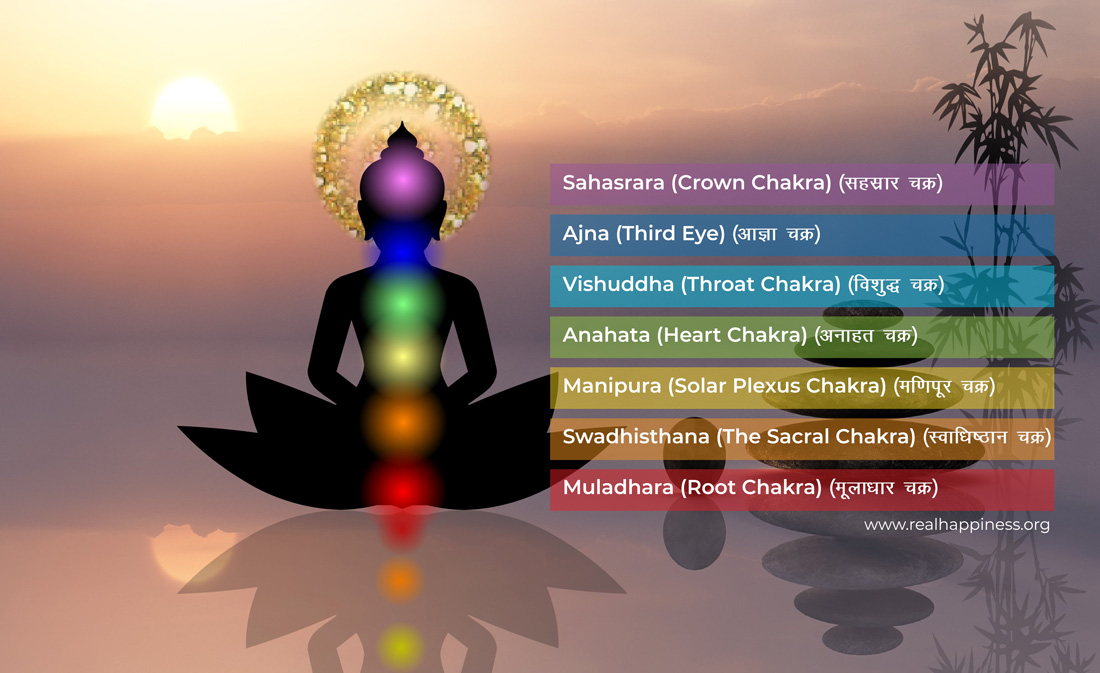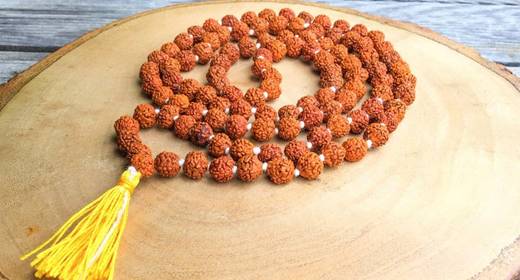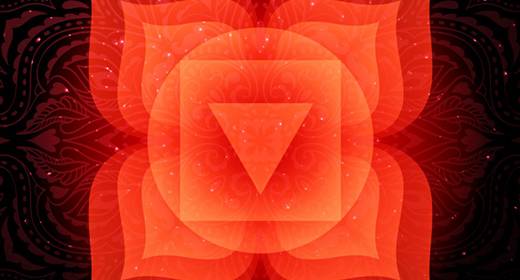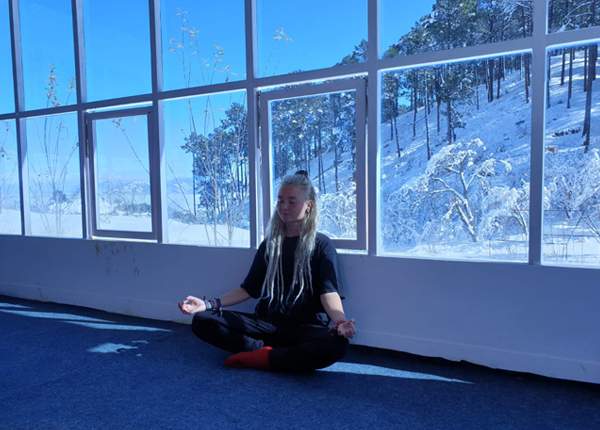KUNDALINI MEDITATION:
Kundalini Yog can transform the way you are within days. It will cause you to make huge changes in your lifestyle and the way you treat yourself and those around you. Hence it is also advised to stay away from too much social contact and the distractions and temptations of the senses. It may change everything inside your body, and if not done under the right guidance, you may find yourself to be a stranger inside your own vessel. We can awaken the kundalini by creating a conducive atmosphere for it to rise gradually or the other way would be to provoke it to rise quickly. A quick rise will also cause quick changes, while a slow rise will cause slow changes in time which you may be capable of handling better.
We usually compare the kundalini to the symbol of a snake, because it is easier to imagine the process of a snake uncoiling itself and gradually traveling upwards along the Nadis, it connects the 6 main chakras from the Mooladhara, where it uncoils, and travels upwards to the Swadisthana, the Manipura, Anahata, Visuddhi and ends at the Ajna or third eye chakra. This is another reason why it is compared to a snake. Once uncoiled completely, it touches all the chakras at the same time and stays in contact with each chakra till it reaches Ajna. Here it stays awakened by being in contact with all of the chakras.
Another way that a kundalini sometimes gets activated is through the process of Bhakti Yog to a particular deity or entity. Here we accept that God knows better than us and it is up to him to activate the chakras. There are in fact about 112 ways to activate our chakras. Some of these include yoga and meditation, specific kundalini yoga and meditation practices, pranayama, guru shakti path (when an enlightened guru touches your head and activates it), and mantra chanting. Once the kundalini is awakened, it never goes back to sleep.
Chakras
7 CHAKRAS LOTUS PETALS NUMBER COUNTING
Muladhara (Root Chakra) = 4 Petals
Swadhisthana (The Sacral Chakra) = 6 Petals
Manipura (Solar Plexus Chakra) = 10 Petals
Anahata (Heart Chakra) = 12 Petals
Vishuddha (Throat Chakra) = 16 Petals
Ajna (Third Eye) = 2 Petals
Sahasrara (Crown Chakra) = 1000 Petals
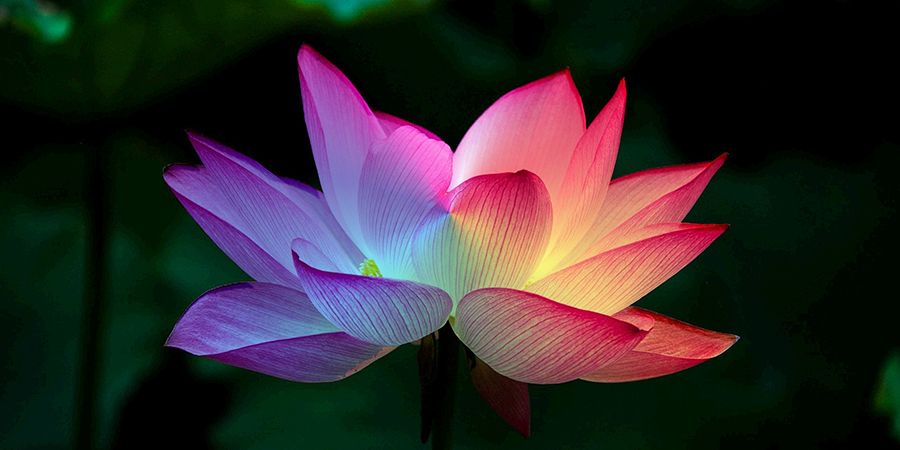
Tip: Formula to remember: [(4+6) = (10)], + [(10)], + [(12+16+2 = 30)], total will be = 50
The first and Second Chakra petals total will be = Third Chakra petals
The other 4 chakras total will be = 30
7 CHAKRAS COLORS
Muladhara = Red
Swadhisthana = Orange
Manipura = Yellow
Anahata = Green
Vishuddha = Blue
Ajna = Indigo
Sahasrara = Voilet

Tip: Formula to remember: ROYGBIV
THE 7 CHAKRAS MEANING ARE:
Muladhara = I am
Swadhisthana = I feel
Manipura = I do
Anahata = I love
Vishuddha = I speak
Ajna = I see or I know
Sahasrara = I understand
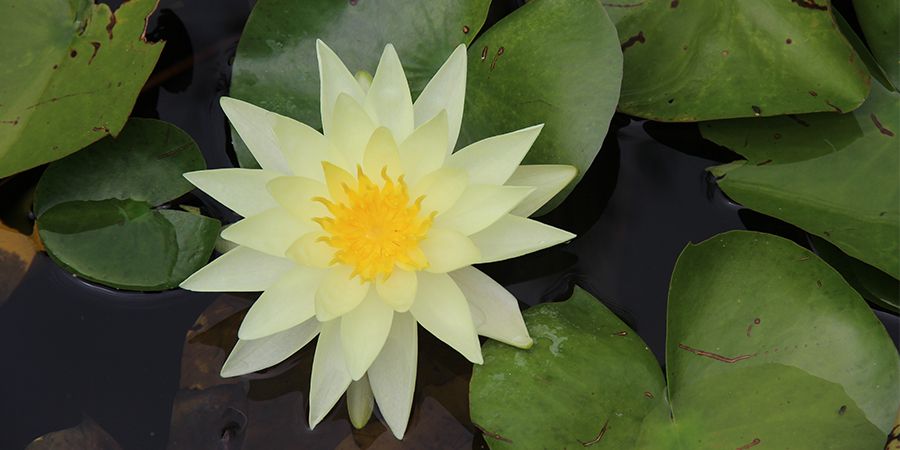
Animals Associated with Kundalini Chakras
-

Muladhara (Root Chakra) = Elephant
The Elephant is associated with Muladhara Chakra because one of the gods of Root Chakra is Indra. Indra is called the king of all gods and his vehicle is Airavat Elephant.

Swadhisthana (The Sacral Chakra) = Crocodile
The Crocodile is associated with Swadhisthana Chakra because one of the gods of Sacral Chakra is Varuna and Varuna is called the god of water and his vehicle is Crocodile.
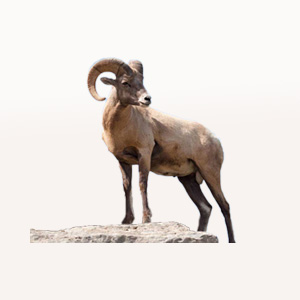
Manipura (Solar Plexus Chakra) = Ram
The animal Ram is associated with Manipura Chakra because the deity Agni is one of the gods of Manipura (Solar Plexus Chakra) and Agni is called the deity of Fire and his vehicle is the animal Ram.

Anahata (Heart Chakra) = Antelope
The animal Antelope is associated with Anahata Chakra because the deity Vayu is one of the gods of Anahata (Heart Chakra) and Vayu is called the deity of Air and his vehicle is the animal Antelope.

Vishuddha (Throat Chakra) = White Elephant
The animal White Elephant is associated with Vishuddha Chakra because the deity Ambara is one of the gods of Vishuddhi (Throat Chakra) and Ambara is called the deity of Akasha Element and his vehicle is the animal White Elephant.

Ajna (Third Eye) = Black Antelope
The animal Black Antelope is associated with Ajna Chakra because the deity Chandra (Moon) is one of the gods of Ajna (Third Eye Chakra) and Chandra is called the Manah or mind of humans and his vehicle is the animal Black Antelope.
-

Sahasrara (Crown Chakra) = Egg
The egg symbol represents a new life or the newborn mind. When someone's energy reaches to Sahasrara Chakra, he/she completely changes and got enlightenment and reaches the state of Nirvana (nothingness).
Yantras
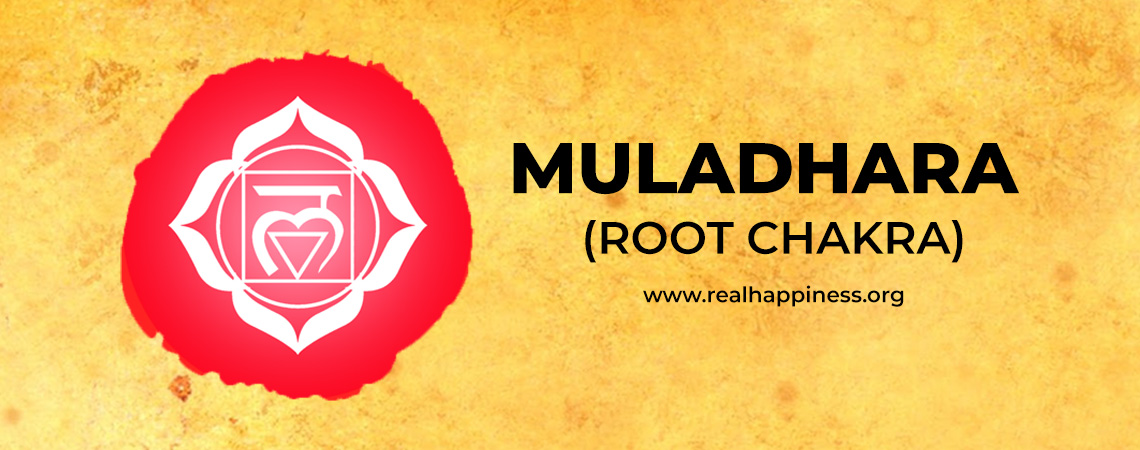
MULADHARA - THE ROOT CHAKRA
Muladhara is the 1st chakra located at the root and is the basis of Existence. Mula or Mool means root and Adhara mean the basis. It is symbolized by a lotus with four petals and the color red. Muladhara is also so near to Kundalini Energy that's why a yogi should practice Kundalini Meditation to awaken Muladhara first, because the level of interest is always increased when you feel something inside. More than 95% of people never try to awaken the Chakra's or just die on this chakra. Muladhara Chakra direct relation is with sexual desires, laziness, sleep, attractions, lust, greed, anger, sadness, joy, trust, disgust, allergy and much more.
Muladhara is located near the coccygeal plexus beneath the sacrum, or a superficial activation point is located between the perineum and the coccyx or the pelvic bone. Because of its location and connection with the act of excretion, it is associated with the anus. Muladhara is said to be the base from which the three main psychic channels or nadis emerge: the Ida, Pingala and Sushumna. It is also believed that Muladhara is a subtle abode of the Hindu God Ganapati. In the highest revered prayer for Ganapati, the Ganapati Atharvashirsha, it is mentioned that "one who worships Lord Ganapati would easily grasp the concept and realize Brahman. The seed mantra syllable is लं (lam).
Mool - root. Adhara - base / foundation. Hence it is called the root chakra.
This chakra is located at the base of our spine on the back part of our body. It is the perineum in the male body and the cervix in females.
It is associated with food and sleep. When this chakra becomes activated, food becomes a selective process and one sleeps with awareness, you are even aware when you are dreaming.
The Muladhara chakra is the resting place of the dormant serpent. It is the source of all energy whether sexual, emotional, mental, psychic, or spiritual. The more you are conscious of this chakra even when you are not meditating, the higher your chances of activating it. To concentrate on it, we visualize the color red while focussing on the perineum or cervix of the spine and repeat the Lam mantra.
When this chakra is not activated, a person can be increasingly lazy, angry, slow, in a habit of postponing things, and have a very Kapha-like personality.
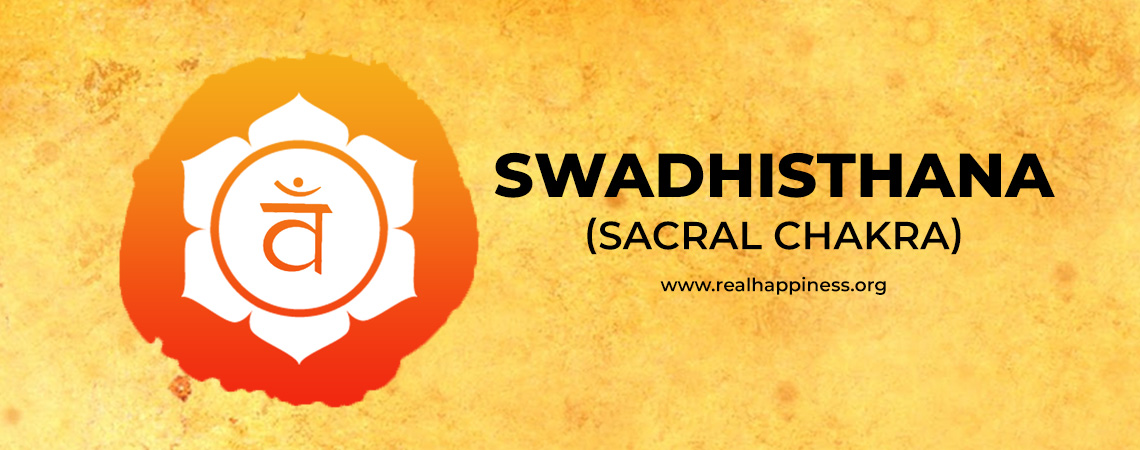
SWADHISTHANA CHAKRA
Swadhisthana is the 2nd Chakra and its meaning is "Swa" means self and "adhishthana" means established, so "where your being is established". This chakra is blocked by fear especially the fear of death. Svadhisthana is located two finger-widths above the Muladhara chakra. Svadhisthana contains unconscious desires. Swadhisthana blockage indicates a lack of creativity, stress, fear of sadness and also happiness, instability, addiction, dependency, low confidence and much more. The meaning of Swadhisthana is "I feel" which means this chakra is directly related to feelings. Because this chakra relation is with water so it is symbolized to the life flow, fluency and exploring nature.
One who meditates on Svadhisthana is believed to obtain the following siddhis: freedom from enemies, the status of a lord among yogis, eloquence and clarity ("words flowing like nectar in well-reasoned discourse"), loss of fear of water, awareness of astral entities and the ability to taste anything desired for oneself or others. The seed mantra syllable is वं (vam). Because this chakra is related to water and the lord of water is Varuna, so, the lord of Swadhisthana (the sacral chakra) is Varuna. That's why the seed mantra syllable is वं (vam). This chakra is also a part of the lower chakra so it is very important to activate this chakra.
Swa- self. Adhishthana - dwelling place. The literal meaning can be one’s own abode.
Approximately two fingers above the mooladhara chakras are the swadishthana chakra.
It is associated with fears and all desires including sexual desires. Fear includes the fear of dying, losing someone, the fear of sadness or happiness, and any other big, small, or irrational fears. The activation of this chakra may cause one to travel more, choose courage to face one’s fears, and may also cause an increase in desires and cravings.
The swadishthana chakra is the storehouse of all our past mental impressions and most deep-rooted instincts of humankind. By purifying this center we transcend our animal instincts. We could try to visualize a deep ocean beneath the night sky, whose dark waves represent the movements and flow of our awareness.
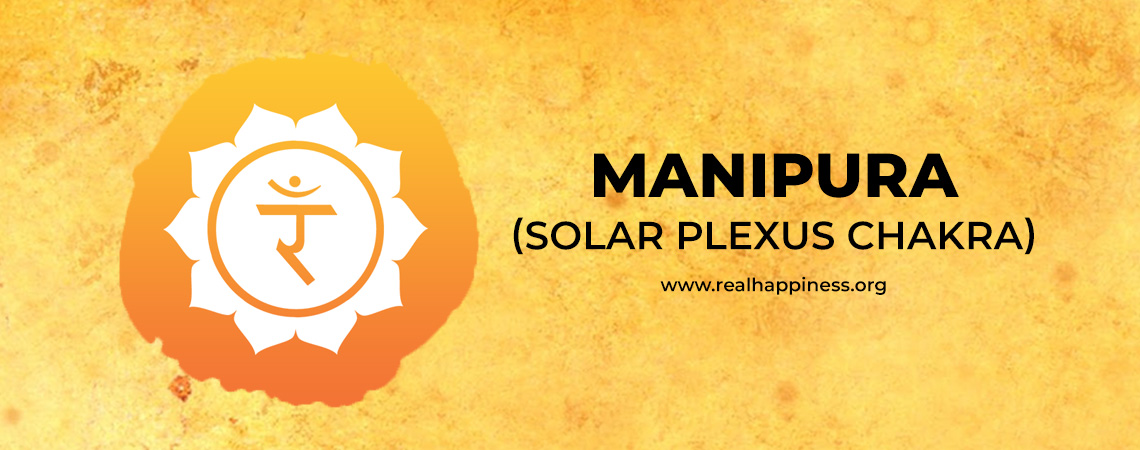
MANIPURA CHAKRA
Manipura (Solar Plexus Chakra) is 3rd primary chakra located above the navel and it is an important chakra for humans. Manipura literally means "resplendent gem", the mani (gem) was found in Vedic stories as a property of Naag and Naagin (Male and Female Snake). Manipura directly indicates the yogi's transformation because it is the home of Fire and vital wind Samana Vayu which controls govern digestion and metabolism. The seed mantra (Beej mantra) is the syllable 'ram' रं. Within the Bindu, or dot, above this mantra resides the deity Rudra (Mahadev Shiva). Because this chakra is related to Fire so that's why the lord of Solar Plexus Chakra is Shiva.
One who activates the Manipura, always be happy and focusing on Karma. This chakra helps to remove all the doubts about destiny because one who is enamored with Karma knows the role of destiny in life. Manipura is the last chakra of the lower chakra series. So once a Yogi Activates it, he will be so close to getting a balanced life and removal of all obstacles of life. Karma is so important in life because it gives results, so by activating the Manipura (Solar Plexus Chakra) you will always take an interest to do some productive and never excuse and run from Karma. Manipura is considered the center of karma power, dynamism, energy, will power and passion.
Mani-gem ,pura -place. Therefore the storehouse of gems or jewels.
This is located on the back of the spine just below the navel area or the solar plexus. It is directly related to the digestive organs, food metabolism as well as adrenal glands.
This is where karma is recognized, a person whose Manipura is activated ends up becoming a Karma Yogi. He travels because of the activation of the swadisthana chakra but then returns home as he realizes that real happiness lies at home and this is where he chooses to do his Karma as it will bear him the most fruit. Karma referred to here can be of any form and should not be confused with Karma Yoga for others.
Eg: Gautama Buddha left home and traveled in search of himself and peace. When he found this, he started to realize that he couldn’t share his knowledge or Gyan while he was constantly traveling. At this time, he chose to stop at one place and from here he started to preach.
This chakra is called the hidden gem because we can change our destiny with our karma. (To know more about Karma and Destiny, please refer to our Vipassana article)
When this chakra is activated, we work smart instead of hard. All our psychological processes are speedier, making us more alert with a higher level of intensity in our bodies' abilities and blood circulation. When this chakra is dormant, those people don’t understand the value of karma or intentions, They are finicky and tend to keep changing their minds. They aren’t considered to be dependable people and generally have a lot of expectations.
To concentrate on this chakra we can visualize a blazing sun or ball of fire radiating from this region and permeating the entire body.
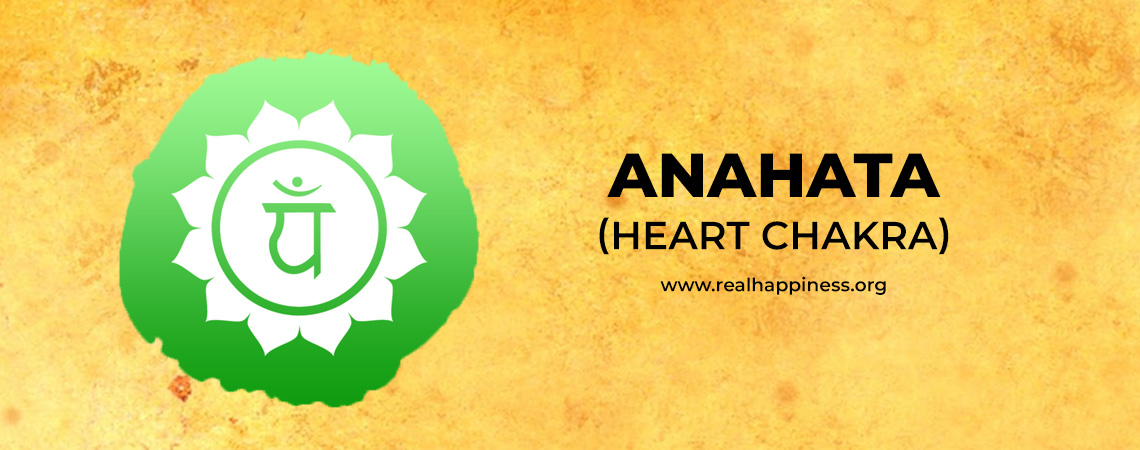
ANAHATA CHAKRA
Anahata literally means "unhurt, unstruck, and unbeaten". Anahata Nad refers to the Vedic concept of unstruck sound (the sound of the celestial realm). Anahata indicates balance, peace and serenity. In Vedic Sanskrit Anahata means "sound produced without touching two parts" and at the same time, it means "pure" or "clean". The heart chakra (Anahata) is located in the central channel of the spine near the heart, some people have doubts that the Anahata is located on the left side of the chest which is the heart position, but its actual position is the center of our chest, which is also the place of the soul (atma). Anahata (Heart Chakra) is the center of lower and upper chakras.
The Beej mantra/seed syllable is the mantra "yam" यं. Ya(m) indicates the "Yogi", The Krishna is known as Yogi which was a favorite character of Lord Vishnu. Krishna is a yogi because he balances everything being a human in Dwapar Yuga. One who activates Heart Chakra always feels love, compassion, devotion and surrounded by lovely persons. You will focus on the harmonious relationship, forgiveness, trust and unconditional love. The perfect power of this chakra is when it is balanced in terms of love for self and others. In simple words, Anahata activation means love and kindness in a balanced way.
Anahata is the universal sound. This is our heart chakra where the sound of Om is originated, that is, present all over our body. It is endless. The literal meaning of the word Anahata is unstruck.
It is symbolized with a hexagon that is shaped from two triangles. These come from the lower Manipura chakra (yellow) and the higher vishuddi chakra (blue). (Blue + yellow +green)
When this chakra is activated, a person exuberates kindness, compassion, and creativity. Such people function from their heart and are often misunderstood by those with the wrong intentions and sometimes get hurt harder. It is associated with the heart, lungs, and respiratory organs.
Shiv (adi yogi-adi means ancient) meditated to Vishnu
Krishna meditated for everyone since he was Vishnu himself.
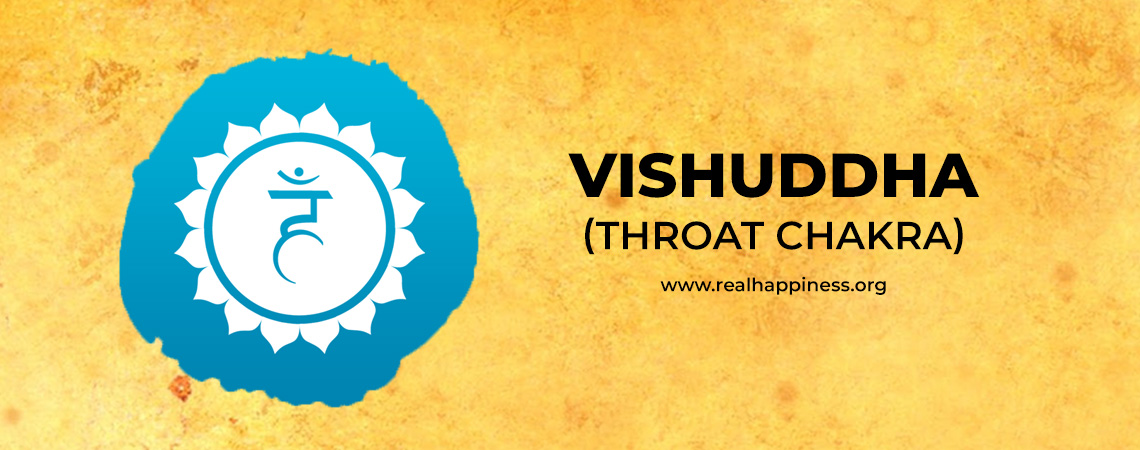
VISHUDDHA CHAKRA
Vishuddha or Vishuddhi, or throat chakra is the fifth primary chakra in our body. Vishuddha is positioned at the throat region above the collarbone in the center of the throat (Larynx). This is 1st Upper Chakra in the body. The Beeja Mantra of Vishuddha is the syllable हं haṃ. Ham represents the goddess "Saraswati" who is known as "Hamsini", this is the reason for this seed mantra called Ham. The goddess Saraswati is the wife of Lord Brahma. This Chakra reigns all the energies connected with the throat mainly vocal. When this Chakra is fully balanced, your communication skills are enhanced. The Vishuddhi Chakra is the starting point of Udana Prana.
The word Vishuddhi literally means "Purification". This chakra represents the sound and the universal element of the body. The Vishuddhi Chakra helps us to have a clear, accurate and apparent vision and vocals. When the yogi's Vishuddhi is activated, he becomes a great leader, a good speaker and a great person. This chakra helps us to aware of the food and breath we take every day. The food, water and air are the main responsible elements of making our body fit and healthy. Vishuddhi is responsible for whatever we say. So accordingly we say, we create. If we say thanks to God every day many times, it will work on our destiny.
Vis- throat, shuddhi- purification. This is the filtration or purification chakra. It is located on the throat, behind the throat pit. It governs the ears, the vocal cords, the larynx region, the thyroid, and the parathyroid glands.
This is the chakra of communication, transparency, speech, speaking, motivation, right understanding, and discrimination. It is also called the Truth Chakra. The dualities of life are accepted and the person in whom this chakra is activated flows with life and allows things to happen as they will.
If it is blocked, the person generally says one thing but does another, they cannot be trusted, have no integrity, and makes empty promises. If their heart is bad, then they tend to create a bad will in relationships with words.
When this chakra starts to open, there is a possibility you will start to feel the snake on your neck. To visualize this chakra, imagine a large white drop of nectar falling down your throat delivering a feeling of bliss.
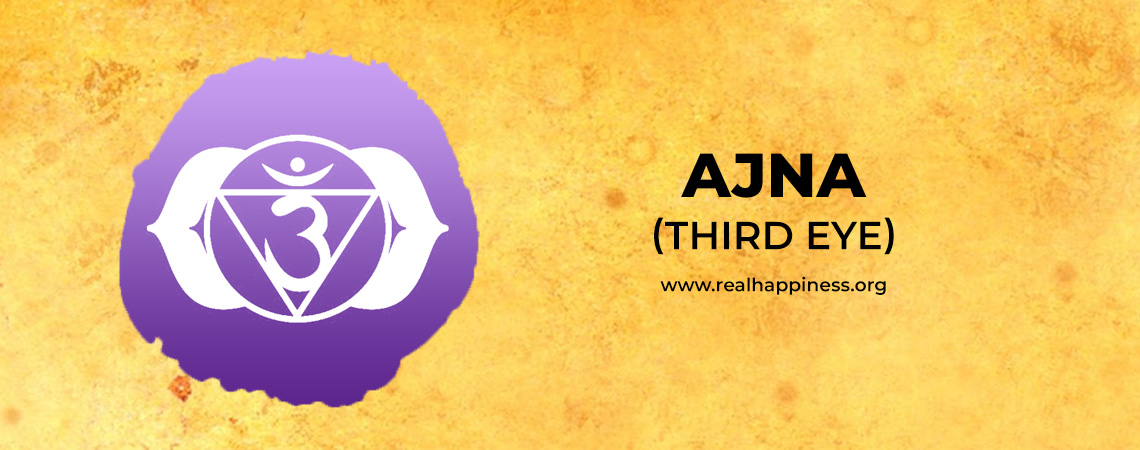
AJNA CHAKRA
Ajna (Sanskrit: आज्ञा]), guru chakra or third-eye chakra, is the sixth primary chakra in the body according to Hindu tradition. Ajna or Agya chakra is also known as Guru Chakra, Guru means who gives us direction in life. So, Ajna gives us the path and answers all our questions. By the regular practice of meditation, focusing on the third eye, a yogi can achieve the state of wisdom. By reaching this chakra, a yogi can be in illusion for a long time because before reaching the wisdom (I see), one can be distracted. The Ajna chakra is located in the center of the forehead between the eyebrows (called the third eye).
The god of Ajna chakra (Third Eye) is Shiva. The seed syllable (beej mantra) of Ajna is "Om" ॐ or ओम which is a well-known mantra (supreme sound of the universe) in Vedic meditation. This mantra is taken from "Omkara", which is a name for Lord Shiva. A person can see the actual things behind the visible things after the activation of the Ajna Chakra. Ajna activation makes a person very clear in vision and imagination of something. After activation of this chakra, you have a feeling of Shivoham Shivoham, Shiv - O - Ham means = I am Shiva and I will never misguide you because I am far from human attachments and I can see the truth.
Ajna - command.
This is the last chakra and is referred to by different names such as the third eye, the eye of wisdom (jnana), Triveni or the confluence of three rivers, guru chakra, or the eye of Shiva. We receive guidance from our inner gurus or our higher selves by meditating on this chakra.
It is connected to the pineal gland and is also our bridge between the mental and psychic dimensions. It is responsible for clairvoyance, clairaudience, and telepathy.
The activation of this chakra leads to an increase in wisdom and intuition. One becomes steady, strong, fully aware, and is able to gain full control of their prana and thoughts. It stimulates all the faculties of the mind and also increases concentration and memory power.
To visualize this chakra, we can imagine a tiny point of light or the Om symbol at the center.
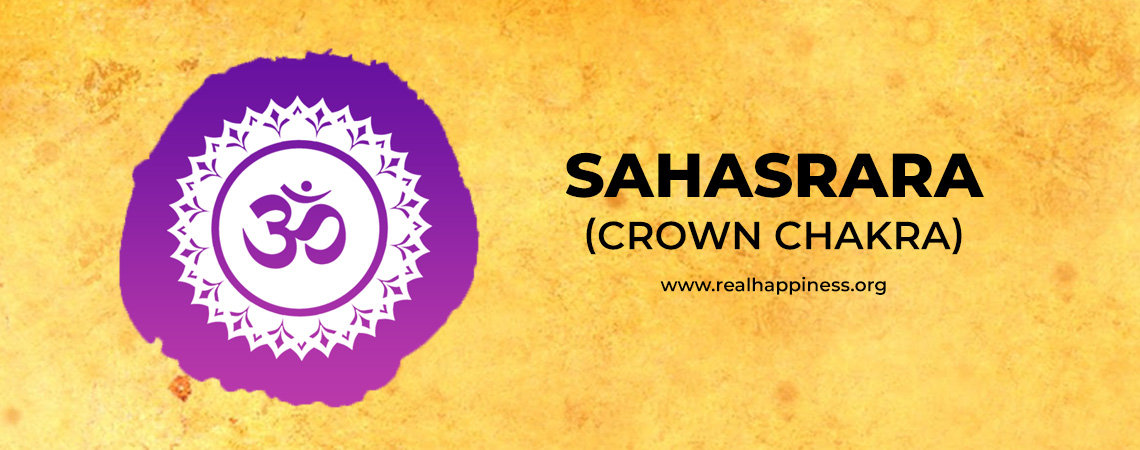
SAHASRARA CHAKRA
Sahasrara (Sanskrit: सहस्रार, Sahasrāra, English: "thousand-petaled"), or Crown Chakra is generally considered the seventh primary chakra in the human body. Crown Chakra is pure consciousness and it means "I understand". By reaching this chakra, a yogi understands everything and never confused in life. Crown Chakra is the symbol of higher-level Awareness of consciousness, Realization, unlimited peace and liberation from limiting patterns. The seed syllable (beej mantra) of Crown Chakra is "Omkar" ॐ or ओमकार which is a well-known mantra (supreme sound of the universe) in Vedic meditation. Only some famous yogi reached this Chakra such as Buddha.
Crown Chakra is a state of Shoonya or Samadhi. Crown Chakra is a connection to supreme power and it is long-lasting happiness and freedom which is achieved by only some great gurus on earth. This chakra is far from sorrow, fear of anything such as death, Agyan (lack of knowledge) and other bad habits of humans. Sahasrara Chakra is limitless powers and a symbol of Infinity. No nature rules will be applied to you if you reach here. Because this chakra has limitless power so it is the hardest chakra to awaken or activate. It may take many-many years of tapa (burning by karma) to activate the Sahasrara and it is only possible when the supreme power wants it.
Sahasrara literally means one thousand which symbolizes the thousand-petalled lotus, there are 50 petals on 20 lines. It is situated at the crown of the head. In the center of the lotus is the jyotirlinga or the lingam of light or pure consciousness. It is the union of Shiva and Shakti, the fusion of consciousness with matter and energy, the individual soul and the supreme soul.
One cannot really meditate on this chakra. It is the state of pure intoxicating bliss that is achieved by jumping into the abyss where one gains supreme knowledge and passes beyond birth and death.
A SIDE NOTE:
Sometimes we hear people talk about their chakras being unbalanced. This can happen if one of the chakras has been activated while the others are still dormant.
For eg: if a person’s Ajna chakra is activated, then this person will always have a thirst for knowledge and philosophy, and thinks a lot but may suffer in areas that concern emotions, feelings, and the heart. It is also possible at times that a chakra gets activated or some of the petals of the lotus may open up unknowingly due to various reasons. But this is not related to Kundalini as the snake always activates them all starting from bottom to top and going simultaneously. The chakras can open in many ways but by default, they lie dormant.
This article is in no way meant to serve as a guide to the activation of your kundalini. We are just sharing information based on our own knowledge and experiences. We reinstate that you must work with a teacher in person if you wish to practice any sort of kundalini awakening, yoga, and meditation.
FAQ's
Frequesntly Asked Questions About Kundalini Chakra:
Q1 - How can Kundalini chakra be activated?
Ans: Kundalini can be activated gradually through meditation, pranayama, mantra chanting, yoga, and a disciplined lifestyle, preferably under proper guidance.
Q2 - What happens when Kundalini is activated?
Ans: When Kundalini awakens, energy rises from the base of the spine through the chakras, increasing awareness, intuition, and spiritual growth.
Q3 - What are the 7 stages of Kundalini awakening?
Ans: The seven stages correspond to the seven chakras: Root, Sacral, Solar Plexus, Heart, Throat, Third Eye, and Crown.
Q4 - What are the side effects of Kundalini awakening?
Ans: Temporary effects may include emotional changes, headaches, energy sensations, disturbed sleep, or restlessness, especially without proper guidance.

